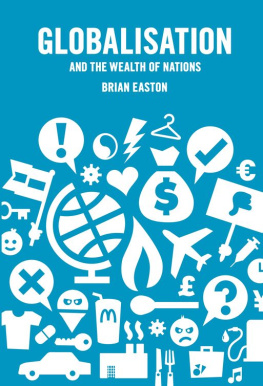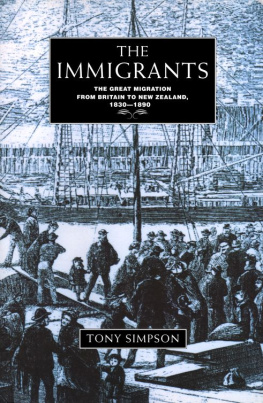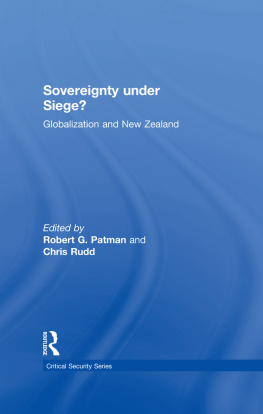Brian Easton - The Whimpering of the State: Policy after MMP
Here you can read online Brian Easton - The Whimpering of the State: Policy after MMP full text of the book (entire story) in english for free. Download pdf and epub, get meaning, cover and reviews about this ebook. year: 2013, publisher: Auckland University Press, genre: Politics. Description of the work, (preface) as well as reviews are available. Best literature library LitArk.com created for fans of good reading and offers a wide selection of genres:
Romance novel
Science fiction
Adventure
Detective
Science
History
Home and family
Prose
Art
Politics
Computer
Non-fiction
Religion
Business
Children
Humor
Choose a favorite category and find really read worthwhile books. Enjoy immersion in the world of imagination, feel the emotions of the characters or learn something new for yourself, make an fascinating discovery.

- Book:The Whimpering of the State: Policy after MMP
- Author:
- Publisher:Auckland University Press
- Genre:
- Year:2013
- Rating:5 / 5
- Favourites:Add to favourites
- Your mark:
- 100
- 1
- 2
- 3
- 4
- 5
The Whimpering of the State: Policy after MMP: summary, description and annotation
We offer to read an annotation, description, summary or preface (depends on what the author of the book "The Whimpering of the State: Policy after MMP" wrote himself). If you haven't found the necessary information about the book — write in the comments, we will try to find it.
A successor to the widely read The Commercialisation of New Zealand, this book by a leading independent commentator continues the story of the New Zealand reforms, giving a trenchant and critical account of recent political and economic change and its impact on different sectors of New Zealand society. Includes case studies.
The Whimpering of the State: Policy after MMP — read online for free the complete book (whole text) full work
Below is the text of the book, divided by pages. System saving the place of the last page read, allows you to conveniently read the book "The Whimpering of the State: Policy after MMP" online for free, without having to search again every time where you left off. Put a bookmark, and you can go to the page where you finished reading at any time.
Font size:
Interval:
Bookmark:
Culture and Reform
Culture and Reform
If we want things to stay as they are, things will have to change.
Giuseppe Tomasi di Lampedusa, The Leopard.
Following a distinguished career in his discipline and in tertiary administration, a friend became the chief executive of another tertiary institution. Admittedly it had particular problems (they all do), but it was also suffering, like the rest of the tertiary sector, from the tertiary reforms. It found itself poorly located for its market, with the wrong physical structure, some of its courses were obsolete, it was overspending... The new chief executive tackled the tasks energetically and sensibly. Perhaps he could have done so more slowly, but the pressures were urgent. Yet deep in the institution were long-established teachers who were happy with what they had been doing, and who did not understand the need for change. There was bitter resistance. Eventually the reforming chief executive left. This sad story symbolises the failure of the commercialisation reforms. The rogernomics elite could change policy and the institutional environment. But they had no popular mandate. The unco-opted populace, not understanding the case for change, resisted it. Charged by the policy-determined environment with the task of implementing change, my friend found himself sandwiched between the new policy and an uncomprehending public.
It is not only in the education sector that such clashes occur. It is much less easy to do this in a university or a hospital. Managers generally cannot teach nor perform surgery, and they certainly cannot write poetry.
The persistence of culture, despite the reforms, is instructive. The State Sector Act and the Public Finance Act separated out the accountabilities of ministers, which were for outcomes, and those of their ministrys chief executives, which were for outputs. One of the ministers in the Labour Government who introduced this change was Phil Goff. But in opposition, he became a scourge of ministers, demanding they take accountability for the outputs of their departments. No one seemed to worry that the ministers were not legally accountable for such matters. The popular view is that ministers are politically accountable for most occurrences in their ministries, departments, and crown entities. Culture (and common sense) overruled the reformed law. Here is a clash of cultures. On one side is the policy elite with their culture of commercialisation which, the reformers said, was general rather than specific, but in fact was based on an American perception of the world and the specific discipline of finance (brilliantly portrayed in Bruce Jessons Only Their Purpose is Mad). On the other were ordinary New Zealanders steeped in a culture in which the government was an active partner in the affairs of the people.
Just as fish have trouble defining water, humans have difficulty identifying culture in the sense it is used here. But take a fish out of the water put it on a bicycle and there will be instant piscine recognition that something is wrong. A useful definition of culture is
the human creation and use of symbols and artifacts. Culture may be taken as constituting a way of life of an entire society and this will include codes of manners, dress, language, rituals, norms of behaviour and systems of beliefs.
While this definition includes high culture, it is not the most important part. The notion is respectful of the entirety of culture, and does not sneer at any particular symbols and artifacts of a society. While the definition might imply a society with a single culture, symbols and artifacts have different significance according to location, generation, gender, ethnicity, and class. Typically, and fortunately, within most societies there is sufficient commonality (and toleration of difference) for there to be a notion of a national culture.
This book does not provide a comprehensive account of New Zealand culture: that is a research programme beyond its scope. But there are variations within New Zealand including those, for instance, between the elite and the majority of New Zealanders. Power has its own culture. One way of dealing with cultural differences is to downplay or ignore them. This is well illustrated by a paper, by a recent immigrant Treasury economist, which purported to show the relevance of an underlying economic concept that of the economic actor across cultures, especially the relation between the Maori and [the] European. Despite the politically correct half of the papers title, only 3 of its 39 cited references are about New Zealand (there are more on Japan), a proportion which may well represent its connection with the real New Zealand.
That this could occur barely without comment partly reflects New Zealanders courtesy to strangers, especially to those who are seen as overseas experts. But it also reflects the lack of confidence that the New Zealand elite have in their own culture. The inferiority complex arises partly because New Zealand is small and its written history short, while there is widespread reluctance to recognise the Maori (and Pacific) heritage or to do so only superficially. Partly too there is a diffidence about celebrating nationhood. Undoubtedly the excesses of national chauvinism are to be avoided, but there is nothing wrong in a quiet pride in ones culture. Individuals need to belong to a continuous cultural and historical community rooted in its own physical domain. A commitment to ones culture or nation need not be xenophobic. Indeed, a genuine commitment involves respect for other cultures. Cultural pluralism is to be celebrated, especially given the increasing heterogeneity within each nation. Cultures can be compared, but not ranked.
What is even more unforgivable than cultural chauvinism is the ignoring of culture. And yet that is what the commercialisers tried to do, as they blitzkrieged their policies on the nation. Initially policy changes were successful where the culture of the organisation to be reformed could be destroyed, although that typically involved mass sackings organisational genocide. But as the commercialisers penetrated deeper into the foundations of New Zealand society, they struck an increasingly determined resistance sometimes akin to that of guerillas working in a supportive population. Eventually, the public found a more organised response by changing the electoral system. But if that reform had not happened, it is likely another would have made the policy process more subject to public concerns. (Perhaps we would have had a majority government based on the politics of stasis and the economics of nostalgia.) While the public supported an electoral regime very different from its traditional voting practices, seemingly rejecting their cultural heritage, the principle of a consultative government was deeper than FR voting arrangements.
Jesson called the changes of the last twenty years a financial transformation, because the elite is now characterised as business people primarily interested in financing rather than production. This is well illustrated by the change in the membership of the Business Roundtable from chief executives of New Zealand-owned producer companies when it was founded in the late 1970s, to CEOs from foreign-owned financial companies two decades later. The transformation occurred partly because the reforms implicitly assumed that finance was at the core of economic decision-making. But perhaps even more important, the resulting economic failure, coupled with the simultaneous globalisation of the world financial system, meant that there have been substantial capital inflows into New Zealand since the liberalisation of the external capital account at end December 1984. Much of this has involved the purchase of equity in New Zealand businesses, including those sold by the government of New Zealand. Thus the financial communitys main function is to manage the finances of overseas investors.
Font size:
Interval:
Bookmark:
Similar books «The Whimpering of the State: Policy after MMP»
Look at similar books to The Whimpering of the State: Policy after MMP. We have selected literature similar in name and meaning in the hope of providing readers with more options to find new, interesting, not yet read works.
Discussion, reviews of the book The Whimpering of the State: Policy after MMP and just readers' own opinions. Leave your comments, write what you think about the work, its meaning or the main characters. Specify what exactly you liked and what you didn't like, and why you think so.










